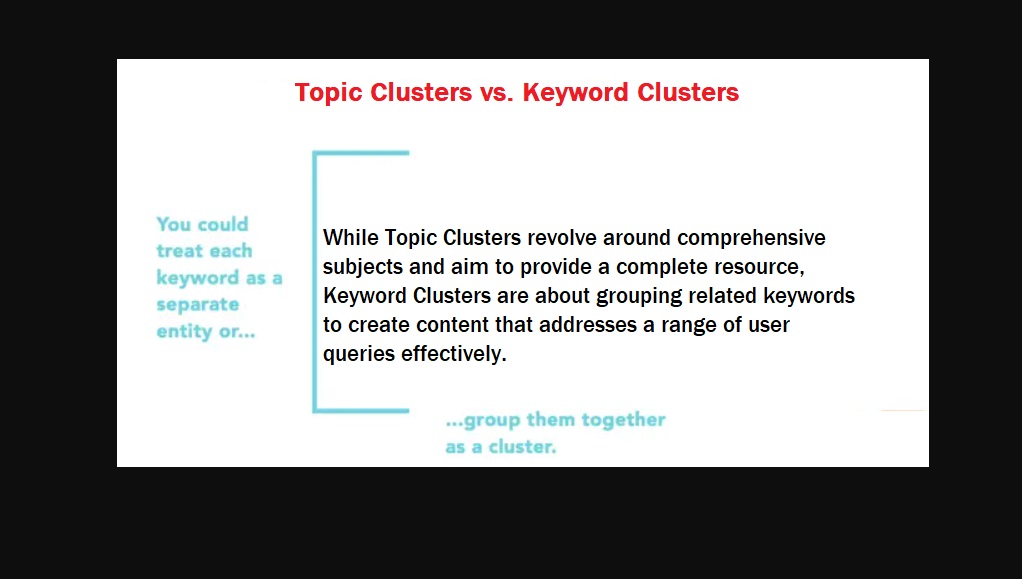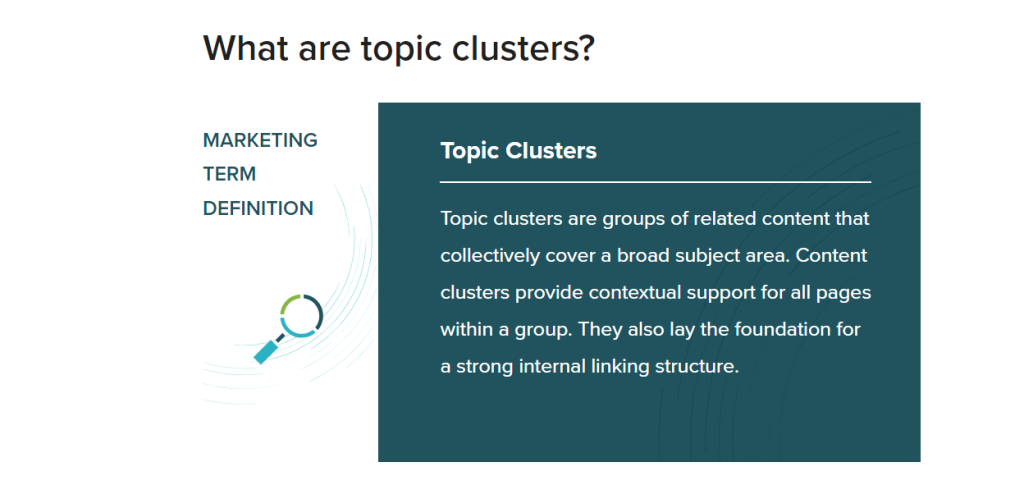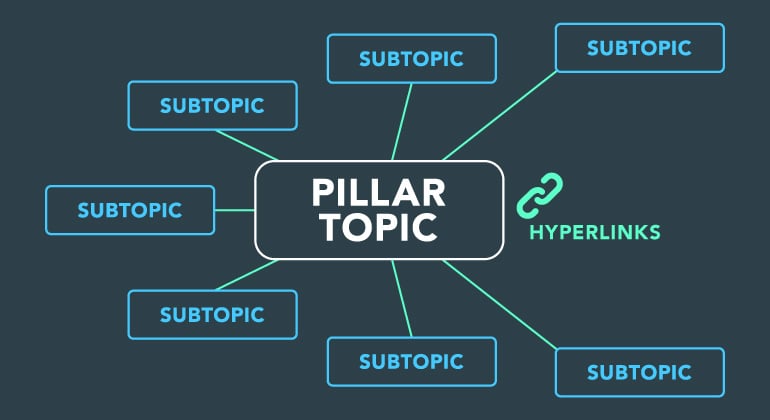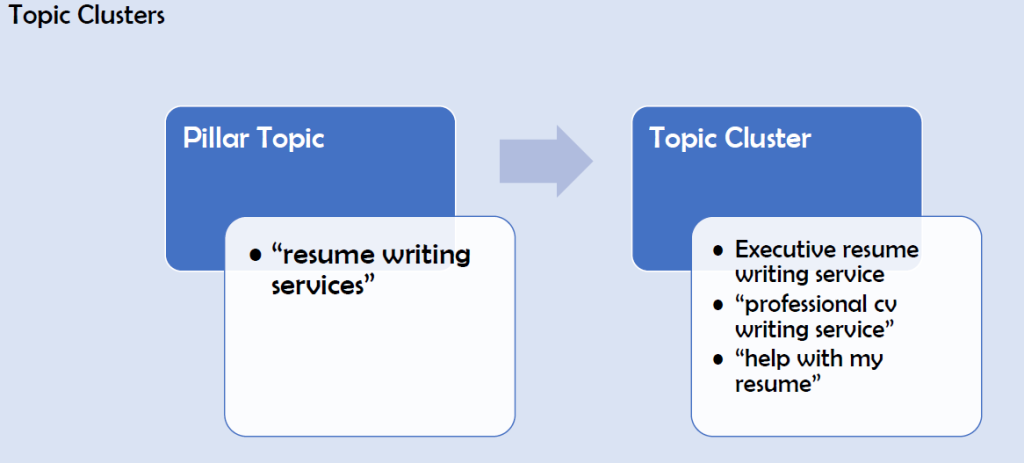Gone are the days when stuffing a webpage with keywords would guarantee high rankings.
Today, search engines are smarter, and the focus has shifted to providing valuable, relevant content.
This has led to the emergence of a new SEO strategy, which primarily shifted focus on topic clusters instead of keywords.
In this guide, we’ll explore the concept of topic clusters, explaining why they’re a preferred approach over merely targeting keywords when implementing an SEO Content Strategy.
Table of Contents
Topic Clusters Vs. Keyword Clusters
Both topic clusters and keyword clusters are important when planning your website’s content.
To gain a comprehensive understanding of these two approaches, we invite you to refer to our previous post, which explains “how to use topic clusters and keyword clusters” and outlines the differences between them.

In a nutshell, both revolve around the strategic approach you take in structuring your SEO content.
Topic clusters prioritize organizing content around central themes, providing a comprehensive and user-friendly experience.
In our previous post on “Mastering Topic Clusters in SEO,” we highlighted their transformative impact on content planning.
On the other hand, keyword clusters focus on grouping similar keywords to target search engine algorithms.
Not only are both approaches essential for enhancing search engine performance, but they also captivate readers, guiding them effortlessly through the subject at hand.
It’s also important to note that a topic cluster is created from keyword clustering results.
What Does it Mean to Focus on Topic Clusters Instead of Keywords?
So, what do the SEO content experts mean when they tell you to focus on topics instead of keywords?
Let’s start by understanding a topical-focused approach.
By creating and implementing a topical map for your SEO strategy, you’re essentially telling both search engines and readers that you’re an authority on the subject.
When done effectively, this approach allows you to cover the topic comprehensively, answer various questions, and address different facets of the main subject—all within a well-structured and interconnected content framework.
This came with the introduction of more sophisticated search engine algorithms, and the limitations of keyword-centric content became more apparent.
Ideally, the shift toward the focus on topic clusters rather than keyword strategies paved the way for optimizing websites for Semantic SEO — which ensured a more rewarding search engine-friendly approach.
In contrast to traditional SEO strategies, topic clusters prioritize the delivery of in-depth and comprehensive insights on a particular subject, significantly enhancing the overall user experience.
On the other hand, conventional keyword-centric tactics tend to focus heavily on repeatedly targeting specific keywords.
This over-reliance on keywords alone often leads to the creation of fragmented content, making it challenging for search engines to fully understand the context.
Why Focus on Topic Clusters?
In a broader sense, the shift toward topic clusters represents a more holistic approach to SEO.
This method is seen as the next evolution of SEO, and an important step for those who want to build topical authority.

Consequently, focusing on topic clusters over individual keywords helps create a more cohesive and comprehensive user experience.
They enhance reader engagement and signal to search engines that the content is authoritative and relevant, leading to higher topic-related content ranking.
The focus on topic clusters not keyword strategies also simplifies content management, allowing for easier updates and maintenance.
Optimizing Your SEO Content Strategy for Higher Topic Cluster Rankings
As we’ve discussed, adopting topical clusters necessitates a change in your approach to SEO content strategy.
While you focus on topic clusters instead of keywords, it’s equally important to ensure their optimization for SEO Success.
In our recent post, we discussed in detail how to create SEO topic clusters when planning your website’s content.
We will revisit the topic briefly with a step-by-step guide to help you focus on topic clusters instead of keyword strategies:
1, Identify Core Topics
Start by identifying and generating topical keywords that are relevant to your audience.
These core topics should reflect the primary interests and needs of your target readers, providing a foundation for your content strategy.
They will also help guide you toward a more detailed keyword research process.
2. Cluster Keywords into Topics
Once you have a comprehensive list of core topics and the results of your keyword research, the next step is to organize these keywords into coherent topic clusters.
In essence, clustering these keywords and topics helps create a clear and structured framework for your content strategy, allowing you to address various facets of each core topic effectively.
3. Create Pillar Content

The clustering results in the previous step should help you develop comprehensive content that covers the core topics in depth.
The Pillar content (main topic) serves as the anchor for your topic clusters, providing a detailed overview of the subject.
The components of the topic cluster (subtopics) should then help guide the creation of content clusters, which we will see in more detail in the next step.
For a successful topic cluster strategy, the content created should be well-researched, authoritative, and engaging, setting the tone for the rest of the cluster.
3. Build Supporting Content
Next, create related cluster content from sub-topics, ensuring that they meet the user’s search intent of the primary topic.
As such, the supporting content should dive into specific aspects of the core topic, offering detailed insights and additional information.
These sub-topics should then link back to the pillar content, creating a cohesive and interconnected topic cluster.
4. Interlink the Sub-Topics Content
Most importantly, ensure that all the content within a cluster is interlinked, providing a seamless user experience.
At a glance, interlinking helps guide readers through the content, enhancing navigation and encouraging deeper engagement with the material.
Transforming Keywords Focus into Clustered Topics
So, is there still a place for traditional keyword targeting within the framework of topic clusters, or has the focus shifted entirely toward a more thematic approach?
The answer lies in a balanced strategy that leverages both by transforming keywords into clustered topics.

The Transformative Role of Keywords
As we transition towards emphasizing topic clusters over singular keywords, it’s essential to recognize that keywords still retain a vital role in the overall effectiveness of your content strategy.
Since keywords serve as the linguistic bridge between your content and search engines, they provide search engines with essential signals about the specific subjects and themes your content addresses.
Therefore, while we shift our primary focus towards holistic topic clusters, we should not disregard the strategic integration of keywords within these clustered topics.
Here’s why keywords continue to matter:
- Content Relevance:
Keywords help establish the relevance of your content to user queries.
When used judiciously within your topic clusters, they guide search engines in understanding the core themes and subtopics, ensuring that your content aligns with user intent.
- Enhanced Visibility:
Well-placed keywords within your topic clusters can significantly enhance your content’s visibility in search engine results pages (SERPs).
By strategically weaving relevant keywords into your content, you improve the chances of ranking higher for specific queries related to your chosen topics.
- User Experience:
While the focus is on comprehensive and informative content, keywords also contribute to the user experience.
Readers rely on keywords to quickly gauge whether a piece of content addresses their needs and interests.
When keywords are thoughtfully integrated into your clustered topics, they aid readers in navigating your content and finding the information they seek.
Integrating Keywords into Topic Clusters
Integrating keywords into topic clusters doesn’t mean reverting to old keyword-stuffing practices.
Instead, it involves using keywords naturally within the content, ensuring that they align with the overall theme of the cluster.
This approach maintains the topic cluster’s integrity while leveraging targeted keywords’ power.
Here’s a deeper look at how this integration works:
1. Natural Incorporation:
The goal is to use keywords naturally within the content. Rather than forcing keywords into the text, they should flow seamlessly, enhancing the reader’s understanding of the topic.
This natural integration not only benefits the user but also aligns with search engine algorithms’ evolving preferences for relevant and context-rich content.
2. Alignment with the Cluster Theme:
Keywords should always align with the overall theme of the topic cluster. In a topic cluster, you have a central pillar page that covers the core subject comprehensively.
Surrounding this pillar page are cluster content pieces that delve into specific aspects or subtopics related to the main theme.
When incorporating keywords, ensure they are relevant to both the specific cluster content and the broader topic covered by the pillar page.
3. Preserving Cluster Integrity:
The objective is to maintain the topic cluster’s integrity. This means that while keywords are strategically placed, they should never disrupt the coherence of the content.
Readers should seamlessly transition between different pieces within the cluster, finding consistent and valuable information throughout their journey.
Ensuring a Harmonious Approach
By blending the depth and context provided by topic clusters with the precision and focus of strategically placed keywords, content creators can establish a harmonious SEO strategy.
This balanced approach offers several advantages:
- User-Friendly Content: Readers benefit from content that is informative, engaging, and easy to navigate. They find valuable information while exploring various aspects of a topic without feeling bombarded by keywords.
- Search Engine Optimization: By focusing on a topical approach instead of keywords only, search engines recognize the depth and relevance of your content.
Consequently, when keywords are integrated naturally and thoughtfully into topics, it improves your content’s visibility in search results.
This strategy can also be seamlessly integrated with gated content as well.
- Maximized Visibility and Engagement: The harmonious blend of topic clusters and keywords ensures that your content appeals to both search engines and human readers.
This, in turn, maximizes the potential for higher search engine rankings, increased visibility, and greater audience engagement.
Ultimately, it improves your lead generation efforts, helping you target high-quality prospects. - Ease of Content Management:
Lastly, organizing content into clusters makes it easier to manage and update, ensuring that information remains fresh and relevant.
This streamlined approach to content management also allows for more efficient collaboration among content creators and editors because it brings a sense of direction.
Final Thoughts
So, why should you focus on topic clusters instead of keyword strategies?
Focusing on topic clusters rather than keyword strategies aligns with modern search engine algorithms that prioritize user intent and interconnected content.
This approach enhances user experience by providing comprehensive information and improves SEO rankings through a more holistic and sustainable strategy.
Overall, embracing the focus of topic clusters over keywords ensures that your content remains relevant, and authoritative, making it a more successful content planning approach.
Whether you’re just starting with the concept of clustered topics or looking to refine your existing strategy, this guide offers insights and practical steps to help you navigate this essential aspect of modern SEO.



